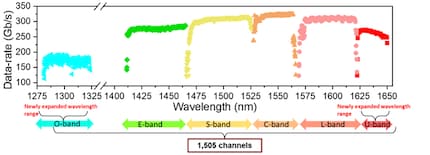
New world record: Japanese research team achieves data rate of 402 Tb/s
Japanese researchers have broken the world record for data transmission. They achieved this using commercially available fibre optic cables under laboratory conditions.
A research team from Japan's "National Institute of Information and Communications Technology" has achieved a data transfer rate of 402 terabits (Tb) per second - or 402,000 gigabits (Gb) - under laboratory conditions. This corresponds to a data volume of 50.25 terabytes (TB) or 50,250 gigabytes (GB) transferred in one second.
This is almost 2 million times faster than the median download speed in Switzerland (according to speedtest.net: 203.5 Mb/s). To put this unimaginably high speed into perspective, a few thought experiments. With 402 Tb/s you could:
- The ten biggest games on Steam (1800 GB), the Playstation Store (1160 GB), the Xbox Store (1315 GB) and the Nintendo eShop (350 GB) in hundredths of a second
- Download the next "Call of Duty" (300 GB) 167 times in one second
- Download over 1600 4K films (50 TB) in one second
- Download the entire Pornhub catalogue (approx. 11 petabytes) in 3 minutes and 39 seconds
Potential for the future
In the experiment, the research group was able to transfer data over 50 kilometres of fibre optic cable with a bandwidth of 37.6 terahertz and a rate of 402 terabits per second. This exceeded the previous record by 25 per cent. The cables are commercially available optical fibres that are already used by many telecommunications companies today.
For the experiment, the team designed a system that covers previously unused transmission bands of the low-loss transmission window of standard optical fibres. The system combines various amplification technologies, some of which were developed specifically for this experiment. You can read all the details about the experiment in the official press release.

Source: NIICT
Further research is needed to replicate even a fraction of this new data rate in the "real world". However, the experiment makes it clear that the fibre optic technology that is already in use is future-proof. The research group is confident that their findings will "provide a significant article for expanding the capacity of the optical communication infrastructure". The use of additional transmission bands could extend the service life of existing fibre optic systems and prevent costly additional expenditure due to the installation of new cable technologies.
50 Gb/s in Switzerland
In Switzerland, telecommunications companies currently offer theoretical download and upload rates of 10 Gb/s with their internet plans - over 40,000 times slower than the measured peak value in Japan. Init7 even offers 25 Gb/s - around 16,000 times slower. Swisscom is preparing for the launch of commercially usable bandwidths of up to 50 Gb/s - this value would be around 8,000 times slower.
Even these theoretical peak values are not (yet) really usable in the real world. If you download a game from the Playstation Store, for example, you will be massively throttled depending on the utilisation of Sony's online store. In other words, the servers offer too little capacity. Even most current SSDs and motherboards cannot handle the theoretical peak values. In the foreseeable future, most Swiss people will continue to download the new "Call of Duty" at the median value of 203.5 Mb/s. That takes 3 hours, 16 minutes and 34 seconds.
My love of video games was unleashed at the tender age of five by the original Gameboy. Over the years, it's grown in leaps and bounds.
From the latest iPhone to the return of 80s fashion. The editorial team will help you make sense of it all.
Show all